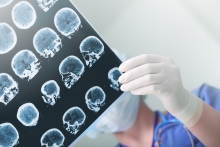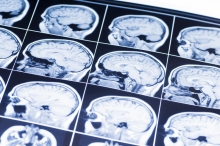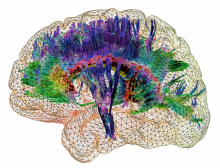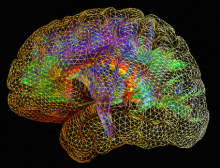Scientists have gained new insights into the part of the brain that gives us a sense of direction, by tracking neural activity with the latest advances in brain imaging techniques. The findings shed light on how the brain orients itself in changing environments – and even the processes that can go wrong with degenerative diseases like dementia, that leave people feeling lost and confused.


McGill University researchers identify proteins that drive cancer stem cells. Targeting and supressing a particular protein called galectin1 could provide a more effective treatment for glioblastoma, in combination with radiation therapy.
Due to its resistance to therapy, glioblastoma is the most common and aggressive cancerous brain tumour in adults. It grows fast and spreads quickly. While treatments such as surgery, radiation, and chemotherapy can help ease symptoms for a few months, in most cases tumour cells regrow after treatment and the cancer recurs.

A group of proteins called 4E-BPs, involved in memory formation, is the key to unlocking the antidepressant effect of ketamine in the brain, according to researchers from three Canadian universities. The discovery could lead to better and safer treatments for certain patients suffering from major depression.
New findings out of McGill University in Montreal have revealed a potential way to overcome aggressive brain tumours' resistance to therapy: by deleting a specific gene. Researchers have long been searching for ways to treat Glioblastomas – the most stubborn type of brain tumour – as they’re well known for their resistance to treatment. A few years back, they were able to confirm the key role a gene called the OSMR gene plays in the process of brain cancer growth.

New insight into a gene that controls energy production in cancer stem cells could help in the search for a more effective treatment for glioblastoma. A McGill-led study published in Nature Communications reveals that suppressing the OSMR gene can improve the effectiveness of radiation therapy.
This approach, led by the laboratory of Arezu Jahani-Asl, Assistant Professor of Medicine at McGill University, was successful in preclinical mouse models where the deletion of the OSMR gene resulted in a significant improvement of tumour response to therapy and expanded lifespan.
The Healthy Brains for Healthy Lives (HBHL) initiative is happy to announce the launch of its Neuro-Innovation Fund. HBHL’s Neuro-Innovation Fund aims to close the gap between proof-of-concept research grants, and funding from traditional investors (angels, venture capitalist, institutional investors). The Fund will provide technology development grants to support further proof of principle and/or add value to new technologies or inventions related to the research themes of HBHL.

On sait que le sommeil et la température de notre corps sont régulés par l'horloge biologique. Charles Bourque, du Centre de recherche du CUSM à Montréal, a découvert une nouvelle fonction qui le serait aussi : la soif. Il en a fait la preuve de façon éclatante chez la souris.

Wild birds that are more clever than others at foraging for food have different levels of a neurotransmitter receptor that has been linked with intelligence in humans, according to a study led by McGill University researchers. The findings could provide insight into the evolutionary mechanisms affecting cognitive traits in a range of animals.
The study, published in Science Advances, was conducted by McGill biologists Jean-Nicolas Audet and Louis Lefebvre, in collaboration with researchers from Duke and Harvard universities.
Barbados birds

Healthy Brains for Healthy Lives (HBHL) is a high profile, high priority multidisciplinary and cross-sectoral initiative located at McGill University made possible with support from the Canada First Research Excellence Fund (CFREF). The HBHL Strategic Research Plan outlines the vision, deliverables, and overall goals of the initiative, and the research priorities of its four research themes.

Canada First Research Excellence Fund's investment of $150 million in McGill University's Healthy Brains for Healthy Lives (HBHL) and Western University's BrainsCAN marks a pivotal step that will unlock the mysteries of the human mind and lay the groundwork for a pan-Canadian network of collaboration that promises to uncover new ways to treat, prevent and cure brain disorders.

New research has drawn a link between changes in the brain’s anatomy and biomarkers that are known to appear at the earliest stages of Alzheimer’s disease (AD), findings that could one day provide a sensitive but non-invasive test for AD before cognitive symptoms appear.
Scientists have known for some time that one of the first signs of AD is buildup of amyloid-Beta and tau proteins in the brain. They have also known that the hippocampus atrophies and loses volume in some AD patients years before cognitive decline.

The same brain-chemical system that mediates feelings of pleasure from sex, recreational drugs, and food is also critical to experiencing musical pleasure, according to a study by McGill University researchers published today in the Nature journal Scientific Reports.


McGill University will launch an ambitious effort to advance understanding of the human brain and ease the burden of neurological and mental-health disorders, thanks to an $84 million, seven-year grant announced today under the federal government's Canada First Excellence Research Fund (CFREF).
The program, Healthy Brains for Healthy Lives, will build on McGill's leading position in neuroscience to make the university a global hub for brain research – one of the major frontiers for 21st century medicine.

Research underlines importance of computational power in future neurological breakthrough
Scientists at the Montreal Neurological Institute and Hospital have used a powerful tool to better understand the progression of late-onset Alzheimer’s disease (LOAD), identifying its first physiological signs.
